Best Rideshare Insurance Reviews: Insurance Offers, Features, Cost, Pros & Cons
By Peter Vanderbuild
January 5, 2025 • Fact checked by Dumb Little Man
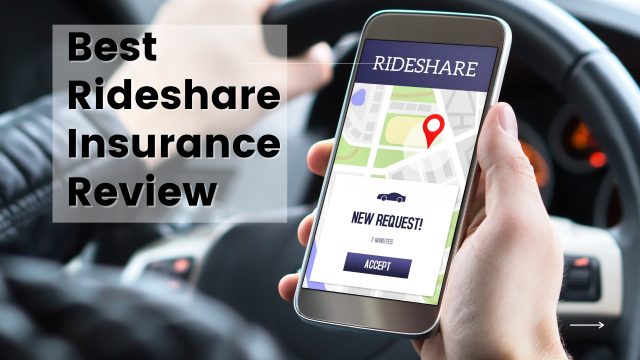
If you have a personal vehicle and you offer rideshare services with the same, it's time you considered Rideshare insurance. This is especially crucial as it helps protect your liability and offers a safe riding experience to passengers. Because there's comprehensive accident coverage, your passengers are duly protected during potential accidents.
However, even before you get rideshare insurance there are a couple of things to consider. Because ridesharing means more large-scale and frequent usage of your vehicle, your existing car insurance agency might further look into that. The same applies even if you have a personal auto policy and a personal auto insurance policy.
Your insurance company will consider the extra drive time that is often correlated with potential accidents. If your personal auto insurance company discovers that you are offering these extensive services without intimating them in the first place, your personal car insurance can be nullified at any point.
They will reduce your liability coverage and insurance coverage especially if it is related to your rideshare experience. This is regardless of companies including (but not limited to) uber and Lyft.
The solution? Get liability, comprehensive, and collision coverage from the best rideshare insurance company. This is where Bestow Life comes to play. Not only do they offer a personal auto policy, but they also offer comprehensive insurance coverage that is tailored to meet your specific requirements.
In case you are still unsure about the best rideshare insurance and are wondering which company stands out, here are a couple of pointers to get you started.
Rideshare Insurance Reviews: What is Rideshare Insurance?

Before you choose the best rideshare insurance, it is crucial to understand what it is and how it works. In this section, we will learn more about the basic concept and features of rideshare insurance.
The concept of Rideshare insurance is quite simple. It simply works by protecting you and the vehicle you primarily use to offer ridesharing services through third-party companies like Uber or Lyft.
It is worth noting that several ridesharing companies (like Uber and Lyft) already provide specific insurance that offers some degree of coverage for the drivers using their platforms.
However, the coverage tends to vary depending on multiple external factors. And that is exactly where a rideshare insurance company like Bestow can help you. These companies offer services beyond your usual ridesharing company coverage, thus, keeping you and your vehicle safe for the longest time.
So, in a way, Rideshare insurance will fill the existing gap between your company insurance policy and personal auto insurance. As previously mentioned, a personal car insurance policy wouldn't offer insurance coverage for moving or transporting customers. Likewise, the policies issued by rideshare companies tend to cover the basics and the minimum. To add to that, several restrictions would apply to the rideshare coverage.
One of the biggest examples would be the insurance coverage offered by Uber and Lyft, where the coverage only lasts for a particular period. That means, if your vehicle and the passengers (in it) are affected or injured beyond that time window, you would need to bear the additional charges of vehicle damage and hospitalization.
Even though rideshare coverage is not legally mandated, people purchasing commercial auto insurance or a personal auto policy can always switch to rideshare coverage for the many benefits it offers.
Thanks to the extensive services of rideshare insurance companies, drivers enjoy extra protection from potential accidents that may damage them or their passengers. Because most ride request drivers consider ridesharing as their primary means of livelihood, it certainly makes sense to get additional rideshare coverage to back up your car insurance and personal coverage.
Should Uber/Lyft Drivers Consider Rideshare Insurances?

If your daily job involves taking paying customers to their desired destination, it's high time you explored the offerings from ridesharing insurance providers and choose the best rideshare insurance for your needs.
This is even more important because (as already mentioned) your job would involve extensive periods where you wouldn't enjoy any commercial insurance coverage. The same applies to personal car insurance which is often limiting for ridesharing drivers. With rideshare coverage, you will get extra financial protection that'll prevent the possibility of unpleasant personal, physical, or financial mishaps.
As you already know, the liability coverage of commercial companies does not offer end-to-end protection to ridesharing drivers. Typically, your commercial insurance will have coverage gaps that can only be addressed by rideshare coverage. Even your basic personal insurance coverage extension wouldn't be sufficient for your ridesharing requirements.
Although the commercial insurance coverage of Uber and Lyft may vary, they basically offer the following few services:
Offline driving
Your commercial insurance provider won't cover you or your vehicle when you haven't logged in to your ridesharing app. What's more, you won't get coverage if you are using the same vehicle for personal requirements. In case of personal rides, you might need additional and separate personal auto insurance coverage.
Waiting for customers
At times, you may be logged into your ridesharing app, but unfortunately, the system hasn't assigned you a customer. During these periods, you wouldn't get any coverage from car insurance companies, unless you have a separate auto insurance policy.
Even if you have personal car insurance, that is less likely to work because technically you are then working for your employer. This results in coverage gaps that can only be addressed by the best rideshare insurance company.
Picking up Customers
The insurance offered by your rideshare company will only come to play after you are assigned a customer and you head on your way to give them their ride. But despite this basic coverage, the liability coverage tends to be limited.
According to our reports, both Uber and Lyft only offer liability coverage of $50,000. Additionally, you get physical insurance coverage of $100,000 and a property damage liability of $25,000.
The amounts may seem big, but they are measly compared to the actual expenses you need to bear at the time of a property damage liability. The coverage gap is extremely extensive and to address that, it is best to buy rideshare insurance.
Starting a Ride
This is the third kind of liability insurance that Uber and Lyft provide to their Rideshare drivers. This is not a deductible gap coverage, but a leading rideshare company will limit its coverage to this extent.
In this case, your commercial auto insurance policy will only apply after you successfully pick the assigned customer and complete the entire duration that had been set for the ride. Once you drop the passenger, your status is back to square one, where you don't have any medical payments coverage, bodily injury liability, collision coverage, either from your personal policy or from your commercial auto insurance policy.
Because of these several reasons, it only makes sense to get the best rideshare insurance in addition to your personal auto insurance policy. This is even more crucial for uber and lyft drivers as they require comprehensive collision coverage and rideshare insurance coverage at all times.
How does Rideshare Insurance Work?

Now that you are familiar with the many reasons why you should consider rideshare coverage, it's now time to understand how rideshare insurance works.
In this section, we will shed more light on the different types of rideshare insurance and how they work. Because you have multiple options, you will have a clearer insight into the kind of rideshare insurance policies that would work best for your needs.
For-Hire-Endorsement
This is a type of rideshare insurance that offers comprehensive coverage to certain specific types of ridesharing vehicles. To qualify for this rideshare insurance coverage, the gross weight of your vehicle should be between 16,000 to 26,000 pounds.
Next, you need to strictly use the vehicle for offering ridesharing services. And finally, your vehicle should accommodate 16 passengers or less (inclusive of the driver).
You cannot qualify for this type of rideshare insurance if you operate medical vehicles or if you are using/transporting a recreational vehicle for sale. Most rideshare companies offer this coverage and depending on your specific requirements, you might want to select it.
Rideshare Endorsement
This type of liability coverage is only offered by the best rideshare insurance companies. Typically, this will apply in conjunction with your personal auto policy and cover your vehicle during the common Period 1 situation in Ridesharing services.
For the uninitiated, Period 1 refers to the time when you have logged on to Uber or Lyft, but haven't been assigned a passenger yet. Although Uber or Lyft claims to offer a hefty sum when you are riding with passengers, during this Period 1, no such coverage shall sustain.
That is why it is crucial to get a Rideshare endorsement along with your personal auto insurance policy and your TNC coverage (if you have one).
With the right rideshare insurance, you will have the same coverage as Uber and Lyft when waiting for a ride. This is an excellent way to address medical expenses during potential accidents. Additionally, the rideshare endorsement will protect your vehicle at all times from collision or property damage.
The next and biggest benefit of rideshare endorsement is probably the fact that it will establish a written record intimating your car insurance company that you are operating for a TNC. This way, they won't be permitted to add the commercial operation of your vehicle as a legitimate cause, during the event of an accident.
This is an excellent benefit in addition to your personal policy. So, if you are planning to purchase rideshare insurance, check this type of coverage and try to figure out if it meets your requirements.
What is TNC policy?
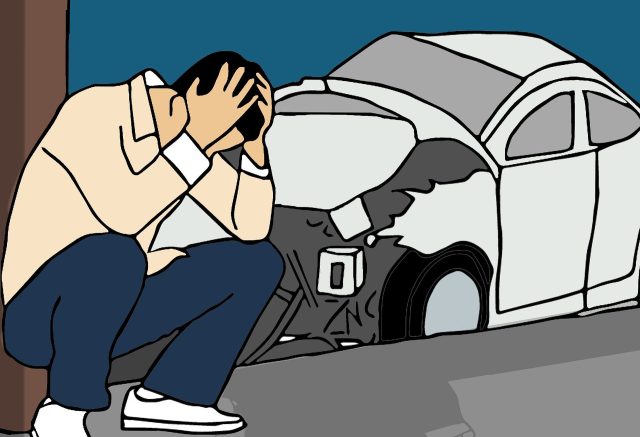
When you sign up for a ridesharing endorsement, you also get a chance to cut down on the high expenses that go towards TNC deductibles. Even though certain specific TNCs offer rideshare insurance on a commercial level, during accidents, you are still expected to pay the entire deductible according to the policy of the TNC.
If you don't already know, a personal policy deductible refers to the out-of-pocket expenses that are often required when raising a claim with auto insurance companies. You will need to pay separate deductibles for liability coverage, rideshare insurance coverage, and collision coverage.
While the cost is significantly less when it comes to a personal car insurance policy, such may not be the case if you are operating for a TNC and comprehensive and collision coverage. In this case, you are expected to shell out up to a whopping $2500.
What's more, you may also be expected to pay when you experience some form of collision when attempting to pick a passenger or when the passenger has experienced some kind of physical damage while in your car.
If you purchase rideshare insurance in addition to the TNC coverage and rental car reimbursement, you can successfully close the gap between your current auto insurance policy and the policy offered by your transportation network company.
The difference is significant and if you are planning to enjoy proper medical payments coverage, collision coverage, and deductible gap coverage among others, you might want to check the services offered by a rideshare company.
Most of them offer varying policies tailored to meet your specific requirements. So, whether it is liability insurance, rental car insurance, deductible gap coverage, or anything in between- you might want to check the different rideshare companies for their comprehensive services.
These insurance providers specifically cater to the requirements of individuals who are looking to offer or are currently offering ride request services.
What is the Rideshare Insurance Coverage?

Rideshare coverage is excellent because it helps address the coverage gaps of your existing auto insurance policy. But what exactly does the best rideshare insurance cover? We will find that and more in the following section.
Offline Coverage
As you probably know, a typical rideshare company like Uber and Lyft wouldn't offer offline coverage. In moments like these, personal car insurance may work, depending on the brand and type. However, because you are on the clock, it may not always apply in your case.
That is why it is important to explore the available rideshare insurance policies and choose one for your needs. A basic rideshare coverage will include offline coverage, which means, both you and your vehicle would be protected, even when you aren't logged in from the application.
Waiting Periods
Depending on the rideshare insurance coverage you have chosen, you will qualify for an insurance that will include personal coverage, collision coverage, and several similar offerings. To be exactly sure about the coverage details, it is best to consult your rideshare insurance company.
Comprehensive coverage
This is yet another defining benefit of rideshare insurance. Thanks to this insurance policy, you get comprehensive coverage for all kinds of situations including but (not limited to) vehicle collision, bodily damage, and property damage among others.
If you have a personal auto policy, you are probably familiar with some of the coverage options. With the best rideshare insurance, you will get a similar kind of coverage.
Coverage for uninsured driver
Rideshare drivers aren't always insured and that is exactly where these types of coverages come to play. Uninsured coverage works the same way as your personal car insurance policies, with a minor exception. With these policies, you will only enjoy the coverage when offering ridesharing services.
Bonus Coverage
Very often, the existing provisions of the best rideshare insurance companies aren't sufficient for some rideshare drivers. That is why, they seek bonus coverages that include varied services including assistance during roadside mishaps, reimbursement of the rented car, et al.
However, because this varies depending on the personal policy deductible of the rideshare company, it is best to check with them about this facility.
Coverage after accepting ride requests
With rideshare insurance, you also get comprehensive coverage after you are assigned a passenger. This works in conjunction with the rideshare insurance that is already provided by Uber or Lyft or any other ridesharing company.
The coverage will extend to bodily harm, damages to your property, and vary depending on the policy of the rideshare insurance. In addition to the mentioned coverage options, you may also qualify for deductible gap coverage or deductible reimbursement. This means you will receive a reimbursement depending on the difference between your existing personal policy and the deductible of the rideshare insurance company.
How much does Best Rideshare Insurance Cost?
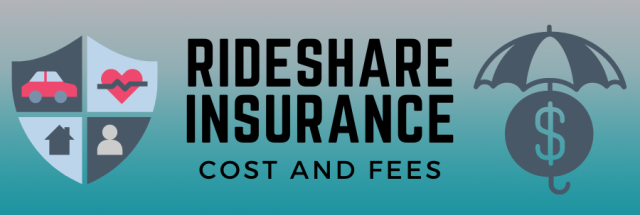
Rideshare insurance is much more inexpensive than you would otherwise assume. That is one of the many reasons rideshare drivers consider it. If you already have personal auto insurance policies, additional insurance from a rideshare company like Farmers would cost you from $6. Alternatively, if you choose Erie, the cost will start from $25 a month.
In case of Allstate, you can enjoy coverage ranging from $15 to $25 annually. However, these coverages, may not be the same and they can vary depending on the riding condition and a range of other external factors.
Who is Rideshare Insurance Best For?

At this point, you are probably wondering whether you should opt for rideshare coverage in addition to your personal car insurance policy. If you offer ride request services, the answer is a resounding yes.
However, there may be other conditions that can make you an ideal candidate for rideshare insurance policies. In this section, we will discuss some of these conditions and factors in detail.
As a rideshare driver, you are perhaps comfortable with the coverage provided by your transport network company. Things are perhaps even better for you if you already have a personal insurance coverage extension.
However, in the majority of the cases, a transportation network company and your personal car insurance policies will have multiple gaps that cannot be addressed unless you have proper coverage from a rideshare company.
Unless you have the extra support from your rideshare coverage, you might find yourself in a murky situation, where you aren't covered for collision by Uber or Lyft and your personal insurance provider.
Certain insurance companies offer rideshare insurance that duly replaces your personal car insurance policy. They operate as a perfect combination of business and personal coverage. This way, the driver is consistently covered regardless of whether they are signed in to the rideshare company app.
Depending on your state, rideshare insurance providers may offer you add-on or endorsement packages that offer more benefits than your personal auto insurance coverage.
Of course, rideshare insurance costs will vary depending on the company. For example, according to State Farm, their bodily injury liability and overall rideshare policy increase the rider's premium by 15%. According to USAA, however, extra rideshare premiums start from $6 a month.
Either way, it boils down to one thing: if you offer ride request services, personal auto insurance policies aren't sufficient for your cause. Even though rideshare insurance options may increase your current auto insurance premium, in the long run, it will serve you well during adverse situations including (but not limited to) vehicle or property damage, and bodily injury liability among others.
Rideshare Insurance Pros and Cons
As with everything else, rideshare insurance options come with a certain set of pros and cons. In the majority of the cases, you wouldn't enjoy the same benefits from your personal insurance company. in this section, we will discuss some of these benefits and disadvantages in detail.
| 👍 PROS |
|---|
► Mandated by the Government Depending on the state you live in, rideshare insurance options may be mandated by the government. That is why it is always an excellent idea to have this coverage. ► Bonus coverage In the majority of the cases, the rideshare app you are working for won't offer protection against collision, especially during your first year. With the right rideshare car insurance, you will enjoy consistent financial protection from any potential damages during this period. ► Lawsuit protection Unless you have the right rideshare car insurance, you won't enjoy comprehensive protection from lawsuit claims, if your passenger or a third party decides to go ahead on it. This is where rideshare insurance companies come to play. These companies not only offer rental car reimbursement and comprehensive and collision protection, but they will also duly protect you from lawsuit claims. ► Medical and Accident Coverage The best rideshare insurance companies will go above and beyond your personal auto insurance policy. These companies will cover your and the third-party's (passenger's) medical expenses during the event of an accident. What's more, you will also receive full reimbursement for any repair you need to undergo following an accident while offering ride request services. The companies that offer rideshare insurance will also offer some sort of reimbursement if your vehicle is missing, vandalized, stolen, or damaged from a natural calamity. |
| 👎 CONS |
|---|
► Specific criteria Certain companies that offer rideshare insurance limit their services to a specific set of personnel. For instance, USAA rideshare insurance only extends its ridesharing coverage options to military veterans and their family members. Whether you qualify for the coverage also depends on your residing state. ► No online claim filing process Another issue with the best rideshare insurance companies is that they do not have any specific process for filing online claims. While this isn't true for all types of companies, Mercury Insurance has this limitation. What's more, their basic coverage option is also highly limited. ► Existing Personal Policy According to some rideshare insurance companies, you need to buy an existing personal policy to quality for their rideshare insurance. Allstate has this limitation as you cannot purchase a new policy unless you already have a personal auto policy with the same company. |
Compare Rideshare Insurance
| Insurance Company | JD Power Rating | AM Best Rating | Multiple Discounts | Gap Coverage |
|---|---|---|---|---|
| None | A+ (Superior coverage option) | Yes | Not Specified | |
| High claims satisfaction JD rating | Excellent | Yes | No | |
| 797 (Customer Satisfaction) | A+ | No | Not Specified |
Now that you have a basic idea of how rideshare insurance works, it's time to check out the best rideshare insurance companies that offer extensive protection and come with a solid JD power rating.
Bestow Life

This is one of the best rideshare insurance companies that offer rideshare coverage without any medical checks. The coverage is extensive and you get plenty of perks on subscribing to the insurance.
JD Power Rating: None
AM Best Rating: A+ (Superior coverage option)
Multiple Discounts: Yes
Gap Coverage: Not sure
Farmers
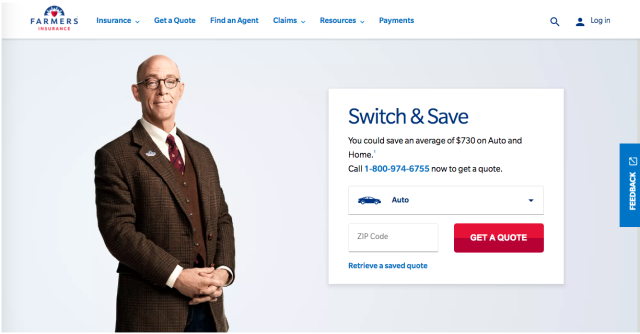
Farmers is yet another company from where you can purchase rideshare insurance. The claim processing option of Farmers rideshare insurance is fairly simple and the company also offers multiple coverage options.
JD Power Rating: While Farmers has a high claims satisfaction JD rating, its customer satisfaction JD rating is fairly low.
AM Best Rating: Excellent
Multiple Discounts: Yes
Gap Coverage: No
>> Full Article Review: Farmers Insurance Reviews: Insurance Offers, Features, Cost, Pros & Cons
Progressive
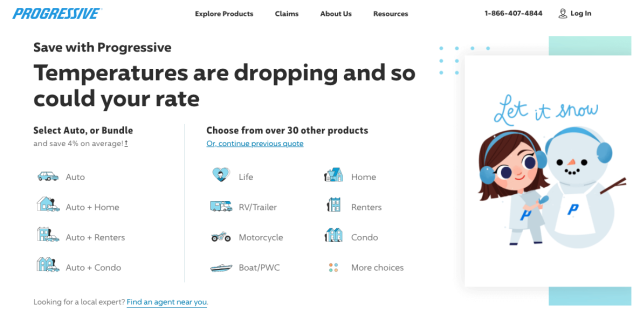
Progressive offers decent rideshare coverage that includes both bodily injuries and water damages. The JD power rating is average and they do not currently offer gap coverage.
JD Power Rating: 797 (Customer Satisfaction)
AM Best Rating: A+
Multiple Discounts: No
Gap Coverage: Not Specified
>> Full Article Review: Insurance Auto Progressive Reviews: Insurance Offers, Features, Cost, Pros & Cons
Rideshare Insurance
While rideshare coverage along with rental car reimbursement may seem lucrative for rideshare drivers, it is crucial to note that the insurance conditions aren't the same in all states and countries. That is why it is especially important to conduct thorough research so that you choose the best rideshare endorsement policy.
In case you are currently residing in a state where the options for availing rideshare endorsement are limited, you might consider purchasing a personal auto policy endorsement from the best car insurance companies.
This will offer an extra layer of financial protection, offering you monetary leverage at all times.
Rideshare Insurance Vs Other Companies
While you will find multiple personal auto policy endorsement options and additional insurance coverage options from your rideshare app, it is best to choose a company that considers all your ridesharing requirements. And this is exactly where Bestow life comes to play.
Bestow is an excellent option for anyone who requires quick coverage in addition to the one provided by their rideshare app. The application process is completely online and almost all rideshare drivers are eligible for the policy.
The best part: unlike other insurance companies that make it a hassle while purchasing rideshare insurance, Bestow Life completes the processing in weeks. The rates are low, no medical checkup is involved, and the coverage option is significantly better than what Uber and Lyft provide.
So, if you are looking for rideshare insurance companies that offer comprehensive protection at all times, Bestow life might just be your best bet.
Final Verdict: Rideshare Insurance
If you already have a personal insurance policy, you might be wondering whether rideshare insurance will help you in the first place. Luckily, it will.
In addition to your personal insurance policy, the rideshare insurance options will offer comprehensive and collision checks, medical payment coverage, and bodily injury liability among others.
You will be covered even when waiting for a ride and enjoy several other benefits that your delivery company wouldn't otherwise provide.
Best Rideshare Insurance FAQs
Does Geico cover ride-sharing?
Yes. Geico rideshare insurance covers ride-sharing. However, their policy will replace your existing personal car insurance policy. You won't get any additional or one-off insurance options from the company.
Does Rideshare insurance cost more?
The cost of average ride-sharing insurance is significantly lower than what people assume. In the majority of the cases, premiums start from $6 a month and can go up to a mere $25 a month. Of course, this will vary according to your insurance company.
Does Allstate cover ride-sharing?
Allstate only allows you to purchase rideshare insurance, only if you have existing personal auto insurance from the company.
Peter Vanderbuild
Trevor Fields is a tech-savvy content strategist and freelance reviewer with a passion for everything digital—from smart gadgets to productivity hacks. He has a background in UX design and digital marketing, which makes him especially tuned in to what users really care about. Trevor writes in a conversational, friendly style that makes even the most complicated tech feel manageable. He believes technology should enhance our lives, not complicate them, and he’s always on the hunt for tools that simplify work and amplify creativity. Trevor contributes to various online tech platforms and co-hosts a casual podcast for solopreneurs navigating digital life. Off-duty, you’ll find him cycling, tinkering with app builds, or traveling with a minimalist backpack. His favorite writing challenge? Making complicated stuff stupid simple.







